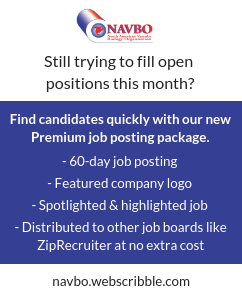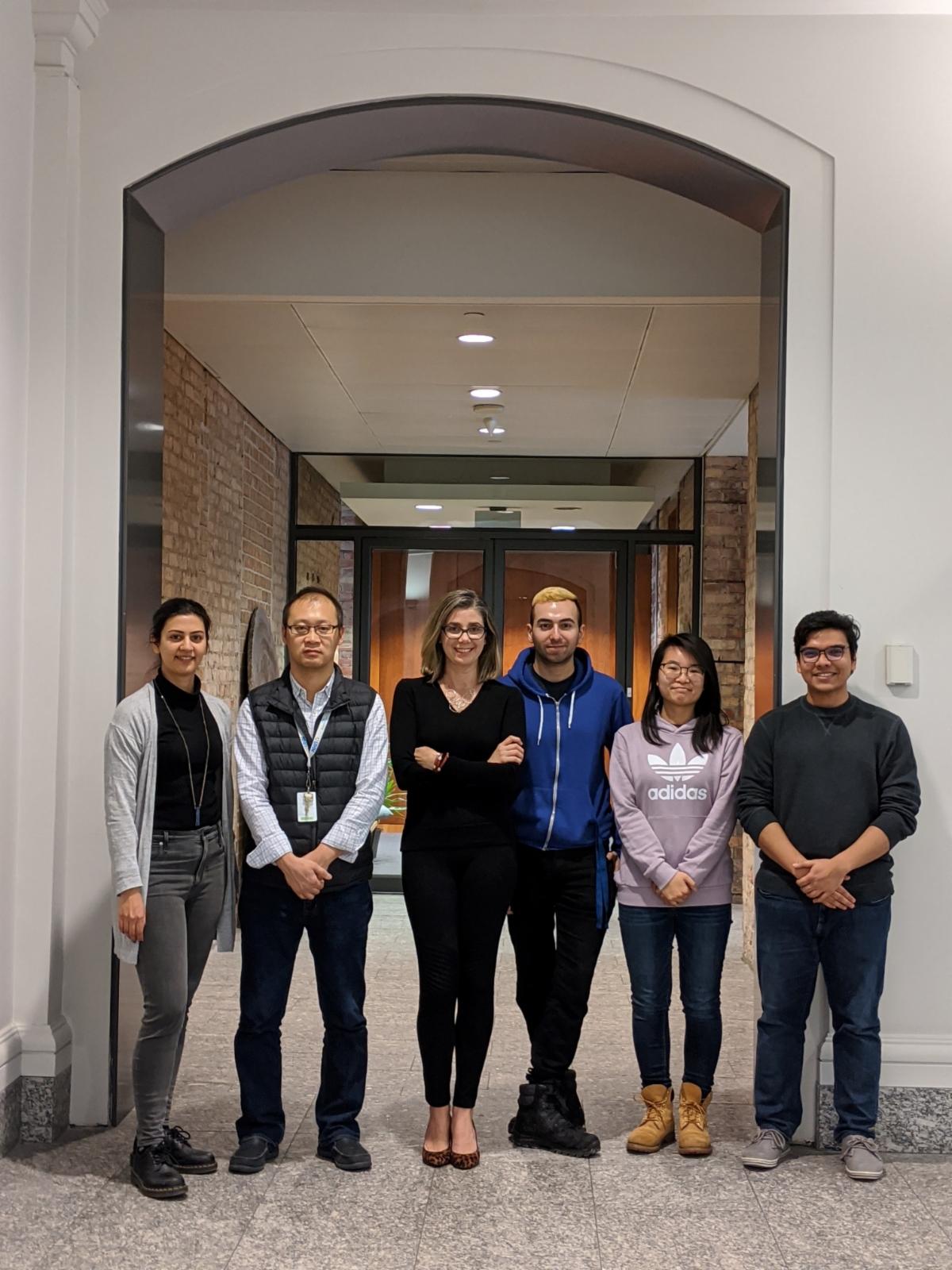|
William R. Huckle, Editor
|
September 9-12, 2020
Abstracts due Feb 29, 2020
|

Boston, MA
July 7-9, 2020
|
Vascular Biology 2020
Newport, RI
October 25-29, 2020
|
Shop at Amazon?
Help Support NAVBO
|
|
Partner Network Advantage on the NAVBO Job Board
|

Why post your job on NAVBO's career center rather than going directly to the larger job networks?
Pricing on the mass job boards can vary, but to get a job noticed you typically have to sponsor it for $5 - $10 per day, which can add up quickly especially since you also pay for each click the job gets. When you add it all together, you could be spending up to $45 per day on your job posting. But, when posting a job on NAVBO's career center, you simply pay a flat fee! The Premium package includes our Exclusive Extended Partner Network - which means the jobs are broadcast to sites like ZipRecruiter and Jobs2Careers and more for a flat fee.
With special member pricing, you can post a job for as low as $300 with this Partner Network. You never pay for each click, just the flat fee on the NAVBO career center. In addition, the Premium package includes a 60-day job posting making it a great value. The Premium packages also offer features like having your company's logo featured on the career center homepage, having your job appear first in search results, and more.
|
Your data privacy and security are important to NAVBO. To that end, we have updated our privacy policy to reflect recent privacy and security regulation implementations and changes.
Please review our policy as time permits so you have a complete understanding of the data we have, why we have it, and how we use it.
Part of the updates relate directly to the European Union's new General Data Protection Regulation (GDPR) that went into place May 25. The GDPR seeks to improve the transparency of data usage and give end users more control over their own data. We believe these changes are important and will be compliant with the GDPR regulations.
Contact NAVBO if you have any questions or to
change your communication preferences.
Please note, you can unsubscribe to this newsletter at anytime by clicking on the SafeUnsubscribe in the footer.
|
|
 |
|
|
Don't Miss Today's Webinar
|

Today's Webinar with Mark Kahn
Today's webinar, our first of the New Year, will feature
Mark Kahn, University of Pennsylvania, and his talk on
"The Gut-Brain Axis in Cerebral Cavernous Malformation."
Plan to join us today, January 23, at 1:00pm EST.

Upcoming Webinars
On February 13 join us for a webinar featuring
Ke Yuan, Boston Children's Hospital, and her presentation titled, "
Mural Cell SDF1 Signaling Is Associated with The Pathogenesis of Pulmonary Arterial Hypertension
Please join us.
Click here for more information and to register for the webinar.
In March, we will host a webinar with
Brant Weinstein, NICHD/NIH titled, "
New Insights into Lymphatics and Lymphatic-related Cells from the Zebrafish" and in April,
Courtney Griffin, Oklahoma Medical Research Foundation, will give her presentation:
What Chromatin Remodelers Can Teach Us About Vascular Development and Integrity.
Join us!! NAVBO Webinars are free to current NAVBO Members. Non-members can attend for $25 per webinar.
And don't forget you can watch archived webinars as well - go to
|
|
Thank You for Your Support!!
|
NAVBO Member Contributions
The following members made contributions to support various NAVBO activities, including scholarships to Vasculata, travel awards to the IVBM and educational programs. We greatly appreciate your support!
Rolf Brekken
Ondine Cleaver
David Dichek
Courtney Griffin
Susan Lessner
Gustavo Oliveira de Paula
Mary Wallingford
|
|
Meet More of the 2019 Travel Award Recipients
|
Travel Awards Available in 2020
In addition to travel awards to NAVBO meetings, we are offering the following:
The Microcirculatory Society Annual Meeting
April 4-6, 2020 in San Diego, CA
If you submitted an abstract to the Microcirculatory Society and are a current trainee member of NAVBO, you are eligible for a Travel Award to the MCS Annual Meeting at Experimental Biology 2020. Applications are due January 31.
Click here for information about the meeting.
International Vascular Biology Meeting 2020
|
|
Vasculata 2021 at Your Institution!
|
Host Vasculata 2021 at Your Instituion
NAVBO continues to bring vascular biology to an ever growing audience by offering Vasculata at various institutions.
Vasculata, NAVBO's 3-4 day summer course, provides an overview of and an introduction to the basics of vascular biology as well as discussing new trends on the horizon.
Vasculata gives students and other trainees the opportunity to network with peers and faculty in an informal and intimate setting. It fosters mentorships and collaborations. Career development sessions as well as hands-on workshops in new technologies are frequently offered. This course is affordable for trainees and scholarships are available for those without sufficient funding.
Please consider hosting Vasculata, it is an ideal way to showcase your institution as well as giving trainees the broader scope of the field of vascular biology.
Proposals are due February 28, 2020
Please note: although we will welcome proposals from any location, we would like to encourage those on the west coast to apply. Vasculatas 2017-2019 were in the mid-west; Vasculata 2020 will be in Boston.
|
|
Vascular Biology Publications Alert
|
|
Seeking New Editor
If you are interested in being an editor for the NAVBO Vascular Biology Publications Alert, please send your CV to [email protected].
Applicants should be current Regular members of NAVBO. We are currently seeking an editor to review the following journals:
EMBO
EMBO Reports
FASEB Journal
Genes and Development
Journal of Biological Chemistry
Journal of Immunology
Editors review the abstracts of papers in their assigned journals and select those most appropriate to be included in our Vascular Biology Publications Alert. We have two teams of editors so this task is performed every other month.
Vascular Biology Publications Alert Now Available by Subscription
The NAVBO Vascular Biology Publications Alert will now be available to non-members for a $55 a year subscription. If you would like to receive this alert, but are not a member, please contact Danielle at [email protected].
|
|
NEW: Online Mini-Symposia
|
Did you present a poster at Vascular Biology 2019?
We are creating a series of online mini-symposia featuring short talks by VB2019 poster presenters.
We hope to present our first session in February, look for more details in upcoming Newsletters.
|
|
Lessons Learned
(from the January 9 issue)
|
Sara Nunes Vasconcelos
My
 name is Sara Nunes Vasconcelos and I have been an Assistant Professor at the University of Toronto since 2014 and a Scientist at the Toronto General Hospital Research Institute since 2012. It has been an amazing journey and I have learned a lot.
name is Sara Nunes Vasconcelos and I have been an Assistant Professor at the University of Toronto since 2014 and a Scientist at the Toronto General Hospital Research Institute since 2012. It has been an amazing journey and I have learned a lot.
In reading the Lessons learned from other PI's I found that a number of 'lessons' really resonated with me, like the value of choosing the right place, seeking out mentoring, making time to write, and finding out which resources are available at your institution, etc. I'd like to add a few things that I learned that may be of value to others as well.
Seek advice but only follow what makes sense to you. When I first started and shared my grant with more seasoned PIs who also sat on committee meeting panels (known as study section in the US) I was taken aback by the somewhat contradictory feedback I received. It was very confusing! When I expressed this to my colleague (and fellow NAVBO member) Myron Cybulsky I heard: "Sara, there are many ways to skin a cat, you have to find out what works for you." And I have been following that advice ever since - thanks, Myron! This is true not just for grants, but for hiring, presenting, teaching, etc. Just because someone has been doing something successfully for a long time does not mean that the same approach will necessarily work for you. In other words, there are no formulas!
Celebrate every achievement. This job can be challenging and is replete with rejections (grants, manuscripts, awards). Do not let these obscure your view of the big picture! I find it helps to celebrate every accomplishment, especially those of your trainees.
Read more about what Sara has to say on our website.
You can view all of the Lessons Learned by visiting our web site. Go to
|
Leaders' Lessons
NAVBO has been providing
Lessons Learned from new investigators in the NewsBEAT for quite some time, however, we realized that there is enormous untapped wisdom that senior NAVBO members could impart with the community. Be sure to look for
Leaders' Lessons, a new regular newsletter feature in which we will share advice from senior NAVBO members on a series of topics related to career development, such as "How can faculty maintain trajectory throughout their career?" and "How should faculty at different career stages divide their time?"
If you have burning questions for NAVBO members, please send your suggestions to
[email protected].
|
The Lab of Dr. Sara Nunes Vasconcelos
 This month we are highlighting the lab of Dr. Sara Nunes Vasconcerlos, who is a Scientist at Toronto General Research Institute and University of Toronto. Find out more about Dr. Nunes Vasconcelos' lab at
http://www.navbo.org/membership/members-labs/853-lab012020.
|
|
Promote Your Presentation on the Web Site
|
Current NAVBO Members Can List Their Upcoming Presentations (Oral or Poster) on our Web Site
Keep members, and all who visit our web site, aware of presentations by NAVBO members. If you are attending the meeting, be sure to attend your NAVBO colleague's presentation. If you are also presenting at that meeting, you can attend each other's presentations and offer mutual support! It can also help make you aware when a colleague is in your town so you reach out and arrange an in-person chat. And finally, this listing can also keep you abreast of other relevant meetings and conferences.
There is a form at the bottom of the page for you to add your presentation.
|
|
ISTH Seeks Feedback on New Project
|
The International Society on Thrombosis and Haemostasis (ISTH) invites
you to provide feedback on the new Venous Thromboembolism (VTE) Common Data Elements (CDE) project.
The goal of the VTE CDE project is to create common research data standards for VTE clinical research throughout the world. CDEs are structured data definitions that provide a consistent framework for clinical research data capture and analysis. CDEs include common clinical definitions, as well as technical metadata such as data type, measurement type, and permissible value lists.
The ISTH VTE CDE project seeks to meet the following goals:
- To establish a consistent, interoperable and universal vocabulary for clinical research that will enable accurate and reproducible capture of clinical concepts and research elements.
- To facilitate the development of clinical research, by increasing opportunities for sharing data across disparate sources (pooled analyses, individual patient-data meta-analysis)
|
Endothelial Colony-Forming Cells
David Smadja and Juan Melero-Martin are co-chairs of a committee on vascular biology (endothelial progenitor cells) at the International Society of Thrombosis and Hemostasis (ISTH), Scientific and Standardization Committee (SSC).
During one of the annual ISTH SSC meeting in Berlin, two years ago, a round table brought together international specialists from several groups and addressed questions regarding endothelial colony-forming cells (ECFCs). As a result, a position paper was written. Despite that effort, however, many more questions remained unanswered regarding the best methodologies for the use of ECFCs.
The group is now trying to collect as much information as possible from laboratories that routinely work with ECFCs. Their goal is to identify and recommend standardized methods that are useful for the vascular biology community.
To this end, a Google survey was created for those groups that routinely use human ECFCs. If this applies to you/your lab, please kindly complete the survey (it should take about 10 minutes to complete).
The outcome of this survey will be reported to the SSC on Vascular Biology at the 2020 ISTH meeting in Milan, and the results will be submitted for publication to the Journal of Thrombosis and Haemostasis.
If you need more information, or if you encounter difficulties in registering, please contact David Smadja ([email protected]) or Juan Melero-Martin ([email protected]).
There is a link on the ISTH webpage with more information about this survey.
Your input is appreciated.
|
|
Special Issue on Vascular Signaling
|
Special Issue of Cell MDPI focusing on Vascular Signalling
Drs. Silvia Dragoni and Patric Turowski, NAVBO Member, are the guest editors, and invite you to submit a contribution for this special issue. Submissions
may be either a full paper or a communication based on research in any area of vascular biology, or it may be a focused review article.
Submissions are due March 30, 2020
Highlights:
- MDPI Cells is an open access journal with a current IF of 5.7
- Articles will be published immediately after acceptance
- Colleagues may be eligible for discounted publication charges (limited availability on a first come first serve basis; please send an email to Dr. Turowski)
More information is available here:
If you plan to submit a review article please provide either editor or Janet Yan at the editorial office ([email protected]) with a title and brief description at your earliest convenience, in order to avoid multiple reviews covering the same material.
The editors wish to be notified if you plan to submit a paper.
|
Welcome to our New Members:
Bridget Parrish,
Oklahoma Medical Research Foundation
Rahul Rajala,
Oklahoma Medical Research Foundation
|
|
Recent Publications by NAVBO Members
|
| BMX Represses Thrombin-PAR1-Mediated Endothelial Permeability and Vascular Leakage During Early Sepsis
Circulation Research
Bone marrow kinase on the X chromosome (BMX) is highly expressed in the arterial endothelium from the embryonic stage to the adult stage in mice. It is also expressed in microvessels and the lymphatics in response to pathological stimuli. Read more Distinct cellular roles for PDCD10 define a gut-brain axis in cerebral cavernous malformation
Science Translational Medicine
Cerebral cavernous malformation (CCM) is a genetic, cerebrovascular disease. Familial CCM is caused by genetic mutations in KRIT1, CCM2, or PDCD10. Disease onset is earlier and more severe in individuals with PDCD10 mutations. Read more Three-Dimensional Imaging Provides Detailed Atherosclerotic Plaque Morphology and Reveals Angiogenesis after Carotid Artery Ligation
Circulation Research
Rationale: Remodeling of the vessel wall and the formation of vascular networks are dynamic processes that occur during mammalian embryonic development and in adulthood. Plaque development and excessive neointima formation are hallmarks of atherosclerosis and vascular injury. Read more VEGF-C-driven lymphatic drainage enables immunosurveillance of brain tumours
Nature
Immune surveillance against pathogens and tumours in the central nervous system is thought to be limited owing to the lack of lymphatic drainage. Read more PERK inhibition mitigates restenosis and thrombosis - a potential low-thrombogenic anti-restenotic paradigm
JACC: Basic to Translational Science
Background: Drug-eluting stents (DES) represent the main-stream management of restenosis following treatments of occlusive cardiovascular diseases. However, DES cannot eliminate instent restenosis yet exacerbate thrombogenic risks. Read more Altered Lipid Domains Facilitate Enhanced Pulmonary Vasoconstriction Following Chronic Hypoxia
American Journal of Respiratory Cell and Molecular Biology
Chronic hypoxia (CH) augments depolarization-induced pulmonary vasoconstriction through superoxide-dependent, Rho kinase-mediated Ca2+ sensitization. NADPH oxidase and epidermal growth factor receptor (EGFR) signaling contribute to this response. Read more PKCβ and Reactive Oxygen Species Mediate Enhanced Pulmonary Vasoconstrictor Reactivity following Chronic Hypoxia in Neonatal Rats
American Journal of Physiology: Heart and Circulatory Physiology
Reactive oxygen species (ROS), mitochondrial dysfunction and excessive vasoconstriction are important contributors to chronic hypoxia (CH)-induced neonatal pulmonary hypertension Read more |
|
Industry News
(from the January 9 issue)
|
JAMA calls attention to unmet needs in Familial Hypercholesterolemia
The International Atherosclerosis Society, together with the Familial Hypercholesterolemia Foundation and the World Heart Federation, has announced the publication of a 'Global Call to Action' on FH in JAMA Cardiology. FH is a vastly under-recognized and poorly managed public health concern, globally affecting 1 of 200-250 people of every race and ethnicity. Currently, only about 10% of the FH population are being diagnosed and adequately treated. The JAMA publication is authored by an international panel of scientific experts, public health officials, and patient advocates from 40 countries and notes glaring gaps in screening and guideline-based care for FH, the most common cause of early and aggressive heart disease.
FY2020 Federal budget, kind to NIH and NSF, signed at year's end
On December 20, 2019 - nearly three months into FY202 - President Trump signed off on close to $1.4 trillion in spending that will keep the government funded through September, averting a shutdown ahead of what's expected to be a lively election season. Most
US research agencies received healthy increases for 2020, with the NIH receiving a 7% boost ($2.6 billion) to $41.7 billion and the NSF being given an additional $203 million (2.5%), lifting its budget to $8.28 billion. The spending measures avoid a repeat of last year's end-of- year impasse that led to a 35-day partial government shutdown, forcing thousands of government workers into furlough or working without pay.
International commission addresses oversight of human genome editing
Just over a year since Chinese scientist He Jiankui announced the birth of twins whose healthy embryonic genomes had been edited, drawing condemnation and alarm from the international scientific community, an international collaborative of scientific and medical academies have formed the
International Commission on the Clinical Use of Human Germline Genome Editing. The group has been tasked with developing a framework that will identify a number of technical, scientific, medical, and ethical requirements that should be considered by researchers and policymakers for any potential clinical application of heritable human genome editing. The commission, in tandem with a WHO expert committee, is expected to release a report in late spring of 2020 to help inform the development of sound regulation and oversight around germline editing.
|
 |
Feb. 7 - 8, 2020
|
11th Charleston Symposium on Vascular Anomalies |
Feb. 16 - 19, 2020
|
Cerebral Fluid Flow and Function: Lymphatics, Glymphatics and the Choroid Plexus |
March 4 - 5, 2020
|
International Conference on Neurology and Neuroscience |
April 1 - 3, 2020
|
EMBO Workshop - Cell Signalling and Biology of Vascular Malformations |
April 4 - 6, 2020
|
The Microcirculatory Annual Meeting at Experimental Biology 2020 |
April 4 - 7, 2020
|
Experimental Biology 2020 |
July 7 - 9, 2020
|
Vasculata 2020 |
July 11 - 15, 2020
|
ISTH 2020 Congress |
Sept. 9 - 12, 2020
|
21st International Vascular Biology Meeting (IVBM 2020) |
Oct. 3 - 6, 2020
|
11th Kloster Seeon Angiogenesis Meeting |
Oct. 25 - 29, 2020
|
Vascular Biology 2020 |
|
|
|